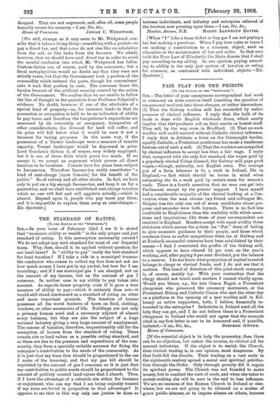RATES AND TAXES.
rro THE EDITOR OF TIIE " sescrrAros."1
Sra,—It is a pity that, owing to the manner in which would-, be speakers do not catch the Speaker's eye, no reply was made to Mr. Harold Cox in Parliament on the Land Values (Scot-
land) Bill. This may have misled many people. The Spectator, for instance, declares, in its criticism of the proposal to base rates on land value :—" In the first place, material things such as sites and houses do not pay rates," and "persons are taxed,
not things." Is that so? In that case, I suppose, by analogy, if we tax imported corn the foreigner will pay the tax, or the
importer, or whoever it is that hands over the cheque. Q.E.D. Free-traders have hitherto insisted that it was necessary to consider the ultimate incidence of a tax. Mr. Harold Cox and Mr. Fred Jowett, politicians who couple rather curiously, both advocate a local Income-tax,—to benefit the landlords ; while the Spectator, in its footnote to Mr. Bell's admirable letter, goes one better, and would base local burdens entirely on dwelling-houses. If the present 50 per cent. tax on house- room is not sufficient, why not reintroduce the old Window. tax at once? "Persons pay taxes, not things." I do not know whether Professor Sidgwick was infected by "the crude outpourings of Henry George's pseudo-economics," but I offer the following for your consideration in the "judicial capacity" you recommend to the Times, and which, to do you justice,
you usually adopt. Professor Sidgwick, in evidence before the Royal Commission on Local Taxation, said :—
"The portion of a tax that corresponds to a house as a product of industry must be paid by the consumer, i.e., occupier (except in. so far as he is a producer who can shift it forward). The portion of a tax corresponding to the ground-value will fall on the owner of the ground. He has no means of escaping it by raising his rent, since it must be assumed to be as high as the demand for houses will allow."
Or you may prefer the "crude outpourings" of Lord Goschen in his reply to Sir Julian Goldsmid, who advocated some such scheme as yours :— " It has been correctly held as an axiom that rates on land con- stitute a kind of rent-charge upon those lands for the benefit of the public. Your proposal involves the relief of the owners of the land from burdens which they have borne for centuries, which have entered into the selling value of those lands, and have been taken into account in every transaction connected with them, and the division of these burdens amongst all kinds of incomes, not excepting those which are derived from personal exertions of every kind."
I think it is time personalities about Henry George were
dropped. They are not argument, and, after all, some people honestly revere his memory.—I am, Sir, &c.,
[We still, strange as it may seem to Mr. Wedgwood, con- sider that it takes a living thing—something with a pocket—to pay a direct tax, and that rates do not rise like an exhalation from the soil, or like larks from the furrows. We admit, however, that we should have said direct tax in order to avoid the mental confusion into which Mr. Wedgwood has fallen. Custom-duties are, of course, paid by the consumer ; but a fiscal metaphysician would no doubt say that they were not strictly taxes, but that the Government took a portion of the commodity which entered the ports, though for convenience' sake it took that portion in cash. The consumer bears the • burden because of the artificial scarcity created by the action of the Government. We confess that we are unable to follow the line of thought in the quotation from Professor Sidgwick's evidence. No doubt, however, if one of the attributes of a special kind of property—as, for instance, land—is that its possession or occupation is held to be an indication of ability to pay taxes, and therefore the tax-gatherer's requisitions are measured by its ownership or occupancy, irrespective of other considerations, the demand for land will suffer, and its price will fall below what it would be were it not a measure for taxing purposes. In the same way, if the possession of a Turner landscape were a measure of taxable capacity, Turner landscapes would be depressed in price. Lord Goschen's dictum is, of course, very widely employed; hut it is one of those dicta which prove too much. If we accept it, we accept an argument which proves all direct taxation to be harmless. Consols have for years been subject to Income-tax. Therefore Income-tax really constitutes "a kind of rent-charge [upon Consols] for the benefit of the public." So of railway and all other stocks. In fact, we have only to put on a big enough Income-tax, and keep it on for a generation, and we shall have established rent-charge taxation which no one will feel and will aggrieve nobody,—which is absurd. Depend upon it, people who pay taxes pay them, and it is impossible to explain them away as rent-charges.-- ED. Spectator.]











































 Previous page
Previous page